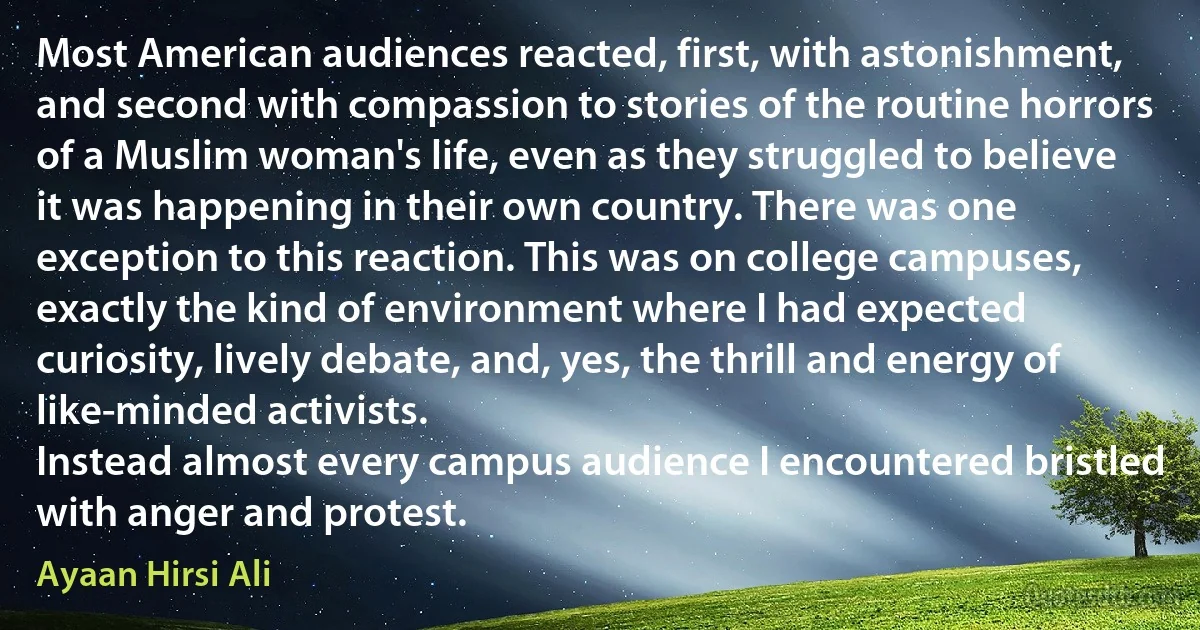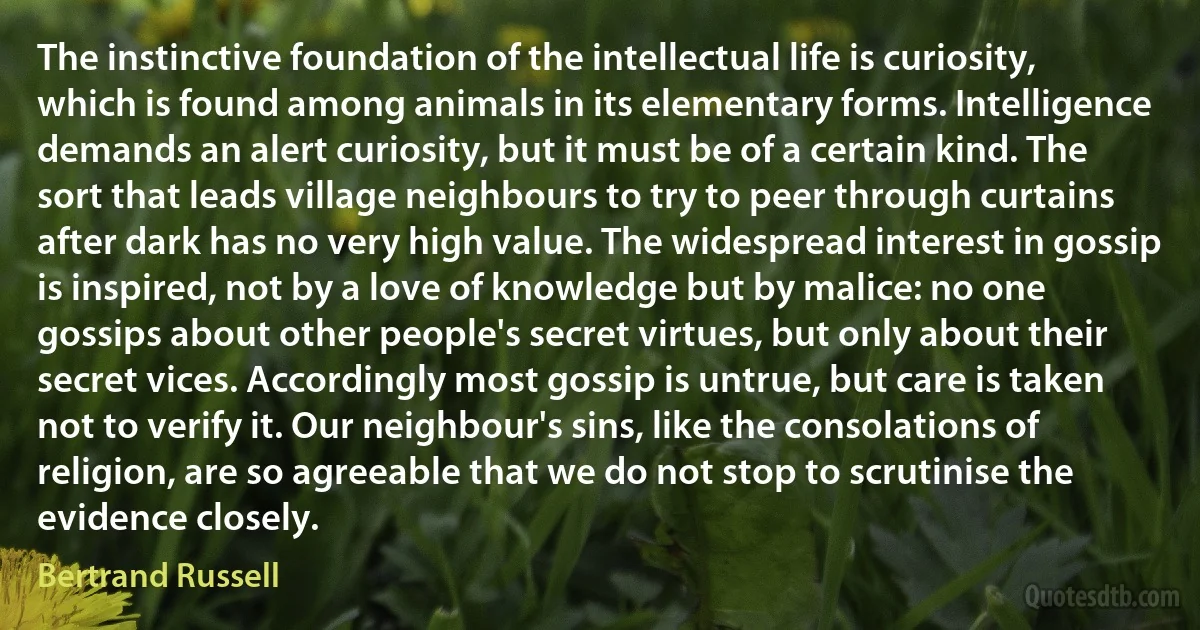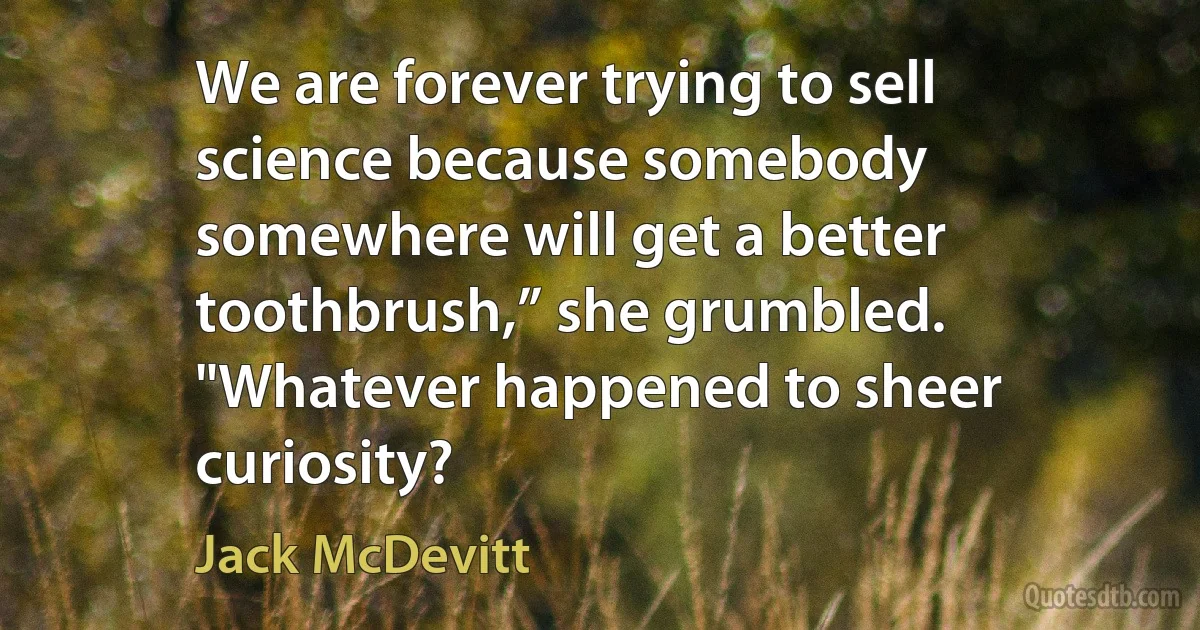Curiosity Quotes - page 25
In conclusion, then, no satisfactory interpretation of quantum mechanics exists today. The questions posed by the confrontation between the Copenhagen interpretation and the hidden variable theorists go to the very foundations of microphysics, but the answers given by hidden variable theorists and Copenhagenists are alike unsatisfactory. Human curiosity will not rest until those questions are answered, but whether they will be answered by conceptual innovations within the framework of the present theory or only within the framework of an as yet unforeseen theory is unknown. The first step toward answering them has been attempted here. It is the modest but essential step of becoming clear on the nature and magnitude of the difficulties.

Hilary Putnam
Of the many monks who had thronged the church, the dormitories and study-rooms, there were two, remarked by all, whom all were watching - Abbot Daniel and the teaching novice, Narziss, only recently entered in the novitiate, yet already, against all tradition, and because of his exceptional gifts, employed, in Greek especially, as a teacher. These two, the novice and the abbot, were respected and heeded by all the house. They were watched and aroused curiosity, admired and envied, slandered in secret. Ch. I.

Hermann Hesse
They got into the car. This time Lakey drove. Listening to Harald's wild talk had disgusted her; she concluded that he was utterly specious. She was ashamed of the curiosity she had felt about him. To be curious about someone opened you to contamination from them. But she was still determined to play him a trick, to take revenge for Kay, for women, and most of all for the impudence of his associating himself with her.

Mary McCarthy
I can never predict what is going to capture my interest and draw me to create. I think it comes primarily from curiosity. I like to play the "what if” game with subjects. "What if slaves owned by Jewish families adopted that religion?” "What if a family living in the proposed footprint of Lincoln Center in 1959 were completely devoted to Jerome Robbins and his work?” "What if a straight guy became a drag queen?” That leads to the next important question of "why?” And then "who?” And so on.

Matthew Lopez (playwright)
In any given society the Remnant are always so largely an unknown quantity. You do not know, and will never know, more than two things about them. You can be sure of those - dead sure, as our phrase is - but you will never be able to make even a respectable guess at anything else. You do not know, and will never know, who the Remnant are, nor what they are doing or will do. Two things you do know, and no more: First, that they exist; second, that they will find you. Except for these two certainties, working for the Remnant means working in impenetrable darkness; and this, I should say, is just the condition calculated most effectively to pique the interest of any prophet who is properly gifted with the imagination, insight and intellectual curiosity necessary to a successful pursuit of his trade.

Albert Jay Nock
Scientific progress on a broad front results from the free play of free intellects, working on subjects of their own choice, in the manner dictated by their curiosity for exploration of the unknown. Freedom of inquiry must be preserved under any plan for Government support of science...

Vannevar Bush
I am trying to describe the people in our quarter, not for the mere curiosity, but because they are all part of the story. Poverty is what I am writing about, and I had my first contact with poverty in this slum. The slum, with its dirt and its queer lives, was first an object-lesson in poverty, and then the background of my own experiences. It is for that reason that I try to give some idea of what life was like there.

George Orwell
The interesting thing about irony for me is that real irony is far more sincere than earnestness. To accept the absurdity of a situation is to accept the humanness of it. Utter sincerity suggests a kind of belief that one knows all there is to know about a given circumstance. That is not to say that one should ever make light of serious and grave and important issues, but that open and genuine intellectual curiosity should never be a casualty in any situation. Irony is not always funny. Humor is not always ironic.

Percival Everett
"Not everyone is concerned with the deep future,” Manfred interrupts. "It's important! If we live or die, that doesn't matter-that's not the big picture. The big question is whether information originating in our light cone is preserved, or whether we're stuck in a lossy medium where our very existence counts for nothing. It's downright embarrassing to be a member of a species with such a profound lack of curiosity about its own future, especially when it affects us all personally! I mean, if there's going to come a time when there's nobody or nothing to remember us then what does –”
"Manfred?”
He stops in midsentence, his mouth open, staring dumbly.

Charles Stross
We are not about to leave the field of doing good simply because harm might happen ... In our four-year publishing history no one has ever come to physical harm that we are aware of or that anyone has alleged. On the other hand, we have changed governments and constitutions and had tremendous positive outcomes...We wanted to make the news, not be the news. But that produced extraordinary curiosity as to who we were ... this attempt not to be the news, made us the news... We are creating a space behind us that permits a form of journalism which lives up to the name that journalism has always tried to establish for itself. We are creating that space because we are taking on the criticism that comes from robust exposure of powerful groups... We do not have national security concerns. We have concerns about human beings.. We have had over 100 legal attacks. We have been victorious in almost every single legal attack... we operate within the rule of law.

Julian Assange
I confess that I have as vast contemplative ends, as I have moderate civil ends: for I have taken all knowledge to be my province; and if I could purge it of two sorts of rovers, whereof the one with frivolous disputations, confutations, and verbosities, the other with blind experiments and auricular traditions and impostures, hath committed so many spoils, I hope I should bring in industrious observations, grounded conclusions, and profitable inventions and discoveries; the best state of that province. This, whether it be curiosity, or vain glory, or nature, or (if one take it favourably) philanthropia, is so fixed in my mind as it cannot be removed. And I do easily see, that place of any reasonable countenance doth bring commandment of more wits than of a man's own; which is the thing I greatly affect.

Francis Bacon
While ritual, emotion and reasoning are all significant aspects of human nature, the most nearly unique human characteristic is the ability to associate abstractly and to reason. Curiosity and the urge to solve problems are the emotional hallmarks of our species; and the most characteristically human activities are mathematics, science, technology, music and the arts--a somewhat broader range of subjects than is usually included under the "humanities.” Indeed, in its common usage this very word seems to reflect a peculiar narrowness of vision about what is human. Mathematics is as much a "humanity” as poetry.

Carl Sagan
And now you must decide which pain you will bear. That of being as you were. Or that of being as you are.”
I brought myself up to my knees. That was as far as I could get. The hand that had held the tea cup appeared again, a full cup in it, the steam rising into my nose. I gulped it, interrupting the gulps with sobs. "Pain of being as I am? I don't understand.”
"But of course you do. The pain of curiosity unsatisfied, of ambition unfulfilled. The pain of love unreturned, of devotion undeserved. The pain of friendship rejected, of leadership ridiculed. The pain of loneliness and labor. Silly child. Did you think living was easy?

Sheri S. Tepper
As was sure, sooner or later, to happen, Adams one day met Charles Sumner on the street, and instantly stopped to greet him. As though eight years of broken ties were the natural course of friendship, Sumner at once, after an exclamation of surprise, dropped back into the relation of hero to the school boy. Adams enjoyed accepting it. He was then thirty years old and Sumner was fifty-seven; he had seen more of the world than Sumner ever dreamed of, and he felt a sort of amused curiosity to be treated once more as a child. At best, the renewal of broken relations is a nervous matter, and in this case it bristled with thorns.

Henry Adams
The human spirit, driven by an invincible force, will never cease to ask: What is beyond? Does he want to stop either in time or in space? Since the point at which he has reigned is only a finite magnitude, greater only than all those who have preceded him, he has scarcely begun to think of it as the implacable question and always without being able to silence his curiosity. There is nothing to answer: there are spaces, times or magnitudes without limits. No one understands these words.

Louis Pasteur
Every great deed of which history tells us, every mighty passion which art can represent, every picture of manners, of civic arrangements, of the culture of peoples of distant lands or of remote times, seizes and interests us, even if there is no exact scientific connection among them. We continually find points of contact and comparison in our own conceptions and feelings; we get to know the hidden capacities and desires of the mind, which in the ordinary peaceful course of civilised life remain unawakened.
It is not to be denied that, in the natural sciences, this kind of interest is wanting. Each individual fact, taken by itself, can indeed arouse our curiosity or our astonishment, or be useful to us in its practical applications. But intellectual satisfaction we obtain only from a connection of the whole, just from its conformity with law.

Hermann von Helmholtz
One story's good, they say, till another's told. Your clients, I will do you the justice to believe, can lye no faster than you can swear. But you seem to forget that the judge and jury generally have the curiosity to hear both sides. You will find it no difficult matter perhaps to black-ball Sam S. but if you can white-wash Mr. H. you'll be a clever fellow indeed.

Joseph Ritson
I am among those who think that science has great beauty. A scientist in his laboratory is not only a technician: he is also a child placed before natural phenomena which impress him like a fairy tale. We should not allow it to be believed that all scientific progress can be reduced to mechanisms, machines, gearings, even though such machinery also has its beauty.
Neither do I believe that the spirit of adventure runs any risk of disappearing in our world. If I see anything vital around me, it is precisely that spirit of adventure, which seems indestructible and is akin to curiosity.

Marie Curie
One evening I went to hear Emma Goldman, out of curiosity. She was an emotional speaker, but not nearly so dangerous looking as she had been pictured by the newspapers. Her talk was a bit bookish, and she looked like a hausfrau, and more maternal in appearance and manner than destructive. She carried her audience along with her like a mother hen followed by a brood of chicks. Sometimes, however, she rose to heights of flaming anger as she cited crimes of the police against workers or the use of federal or state troops to break strikes.

Emma Goldman
He advanced toward me without moving his hat, or making the least inclination of his body; but there appeared more real politeness in the open, humane air of his countenance, than in drawing one leg behind the other, and carrying that in the hand which is made to be worn on the head. "Friend," said he, "I perceive thou art a stranger, if I can do thee any service thou hast only to let me know it." "Sir," I replied, bowing my body, and sliding one leg toward him, as is the custom with us, "I flatter myself that my curiosity, which you will allow to be just, will not give you any offence, and that you will do me the honor to inform me of the particulars of your religion." "The people of thy country," answered the Quaker, "are too full of their bows and their compliments; but I never yet met with one of them who had so much curiosity as thyself. Come in and let us dine first together."

Voltaire
The Brothers Karamazov is a joyful book. Readers who know what it is about may find this an intolerably whimsical statement. It does have moments of joy, but they are only moments; the rest is greed, lust, squalor, unredeemed suffering, and a sometimes terrifying darkness. But the book is joyful in another sense: in its energy and curiosity, in its formal inventiveness, in the mastery of its writing.

Fyodor Dostoyevsky



